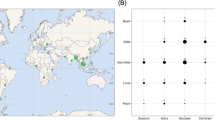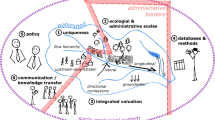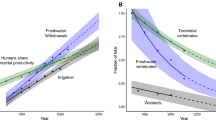Abstract
Transboundary rivers pose significant governing challenges to state actors, as riparian stakeholders struggle to balance their own interests in a critical resource against those of their neighbors. To that end, a case study of Europe’s Rhine River is illustrative, as it provides a strong historical example of shared water management. Indeed, the Rhine experience suggests at least two universal lessons that modern riparian actors the world over would do well to consider when balancing shared riverine interests. First, that transboundary water cooperation is supported by a shared historical legacy of water governance, suggesting that, if a governing regime does not yet exist, riparian actors should purposefully create one in anticipation of future coordination issues. Second, the case of the Rhine demonstrates that an acute environmental crisis is not a necessary condition for intensive shared riverine governance, and instead, it is extant historical collaboration that leads to later effective crisis coordination.
Similar content being viewed by others
Abbreviations
- EU:
-
European Union
- ICPR:
-
International Commission on the Protection of the Rhine
- IWT:
-
International water tribunal
- IRBD:
-
International river basin district
- RAP:
-
Rhine Action Plan
- RBMP:
-
River basin management plan
- WFD:
-
Water Framework Directive
References
Axelrod R, Keohane R (1985) Achieving cooperation under anarchy: strategies and institutions. World Polit 38(1):226–254
Bernauer T (2002) Explaining success and failure in international river management. Aquat Sci 64(1):24–27
Blackbourn D (2006) The conquest of nature: water, landscape, and the making of modern Germany. W.W. Norton & Company, New York
Brunnee J, Toope SJ (1997) Environmental security and freshwater resources: ecosystem regime building. Am J Int Law 19(1):26–59
Central Commission for the Navigation of the Rhine (Rhine Commission) (1868) Mannheim: the revised Rhine navigation document of October 17, 1868
Chamberlain JP (1923) The regime of international rivers: Danube and Rhine. Columbia University, New York
Cioc M (2002) The Rhine: an eco-biography, 1815-2000. University of Washington Press, Seattle
Conference of Rhine Ministers (Rhine Ministers) (2001) Rhine 2020: program on the sustainable development of the Rhine. ICPR, Koblenz
Congress of Vienna (1815). The map of Europe by treaty; showing the various political and territorial changes which have taken place since the general peace of 1814
Disco C (2008) Taming the Rhine: economic connection and urban competition. In: Hard M, Misa TJ (eds) Urban machinery: inside modern European cities. MIT Press, Cambridge, pp 23–48
Disco N (2013) “One touch of nature makes the whole world kin”: ships, fish, phenol, and the Rhine, 1815-2000. In: Disco N, Kranakis E (eds) Cosmopolitan commons: sharing resources and risks across borders. MIT Press, Cambridge, pp 271–316
European Commission (2014) Legal enforcement: the infringements procedure. http://ec.europa.eu/environment/legal/law/procedure.htm
European Parliament and Council (2000) Directive 2000/60/EC of the European parliament and of the council of 23 October 2000 establishing a framework for community action in the field of water policy. OJL 327:22
European Union (2002) Common strategy on the implementation of the water framework directive: project 2.9/best practices in river basin management planning. Version 1.1
European Union (2003) Common implementation strategy for the water framework directive (2000/60/EC): progress and work program for 2003/2004
Frijters ID, Leentvaar J (2003) Rhine case study—technical documents in hydrology, no. 17, SC/2003/WS/54. Paris: UNESCO International Hydrological Programme
Hardin G (1968) The tragedy of the commons. Science 162(3859):1243–1248
International Commission for the Protection of the Rhine (ICPR) (1976a) Convention for the protection of the Rhine against chemical pollution
International Commission for the Protection of the Rhine (ICPR) (1976b) Convention on the protection of the Rhine against pollution by chlorides
International Commission for the Protection of the Rhine (ICPR) (1987) Aktionsprogramm Rhein (Rhine Action Program), Signed at Strasbourg, September 30
International Commission for the Protection of the Rhine (ICPR) (1999) Convention on the protection of the Rhine, decision 2000/706/EC. OJ L 289, 16.11.2000. Signed at Bern, Switzerland, December 4
International Commission for the Protection of the Rhine (ICPR) (2001) The Rhine atlas. ICPR, Koblenz
International Commission for the Protection of the Rhine (ICPR) (2008) The Rhine: a river and its relations. ICPR, Koblenz
International Commission for the Protection of the Rhine (ICPR) (2013) The rhine and its catchment: an overview. ICPR, Koblenz
International Commission for the Protection of the Rhine (ICPR) (2014) Rhine 2020—program on the sustainable development of the Rhine. http://iksr.org/index.php?id=30&L=3&ignoreMobile=1http%3A%2F%2Fwww.iksr.org%2Findex.php
International Commission on the Protection of the Rhine (ICPR) (1963) Agreement concerning the international commission for the protection of the rhine against pollution (Berne convention)
Keohane R (1982) The demand for international regimes. Int Org 36(2):325–355
Krasner S (1982) Structural Causes and regime consequences: regimes and intervening variables. Int Org 36(2):185–205
Lagendijk V (2016) Europe’s Rhine power: connections, borders, and flows. Water History 8:23–39
Molle F (2009) River-basin planning and management: the social life of a concept. Geoforum 40(3):484–494
Myint T (2012) Governing international rivers: polycentric politics in the Mekong and the Rhine. Edward Elgar, New York
Netter TW (1986) New chemical accident sends a cloud over Basel. The New York Times
Ostrom E, Gardner R, Walker J (1994) Rules, games, and common pool resources. University of Michigan Press, Ann Arbor
Oye K (1986) Explaining cooperation under anarchy: hypotheses and strategies. In: Oye K (ed) Cooperation under anarchy. Princeton University Press, Princeton
Page SE (2006) Path dependence. Q J Polit Sci 1(1):87–115
Stein A (1982) Coordination and collaboration: regimes in an anarchic world. Int Org 36(2):299–324
Tuohy W (1986) 4 nations try to cope as river spreads spilled chemicals Rhine suffers ‘Ecological Catastrophe.’ Los Angeles Times, November 13
United Nations Economic and Social Council (UN-ECOSOC) (2013) World population prospects: the 2012 revision. United Nations, New York
Vajpeyi D (1998) Water resource management: a comparative perspective. Greenwood Publishing Group, Westport, CT
Wilken R-D (2006) The recovered Rhine and its history. The Handbook of Environmental Chemistry, 5(L), 47–87
Young O (1977) Resource management at the international level: the case of the North Pacific. Nichols Publishing Co, New York
Young O (1989) International cooperation: building regimes for natural resources and the environment. Cornell University Press, Ithaca
Young O (1994) International governance: protecting the environment in a stateless society. Cornell University Press, New York
Young O (2013) On environmental governance: sustainability, efficiency, and equity. Paradigm Publishers, Boulder
Author information
Authors and Affiliations
Corresponding author
Rights and permissions
About this article
Cite this article
Schiff, J.S. The evolution of Rhine river governance: historical lessons for modern transboundary water management. Water Hist 9, 279–294 (2017). https://doi.org/10.1007/s12685-017-0192-3
Received:
Accepted:
Published:
Issue Date:
DOI: https://doi.org/10.1007/s12685-017-0192-3




